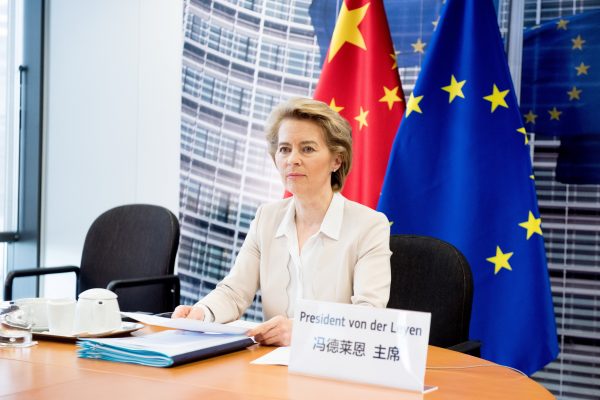Germany, France and the Netherlands already have their own national Indo-Pacific strategies. As does the United Kingdom, now outside the European Union. Policymakers in Brussels hope that a collective EU strategy can augment national ones, and help the bloc strengthen its profile in the Indo-Pacific amid changing global power balances. The European Union is not content to watch great power politics from the sidelines.
Fleshing out the details of a more wholistic EU strategy for the Indo-Pacific will be difficult. Reconciling conflicting interests and ensuring coordination among EU member states to implement it will be even more challenging. A key issue will be finding a balance between the EU’s interest in expanding its economic presence in the region and its desire to support global democracy and human rights. In the interest of both Europe and Asia, EU engagement must avoid certain strategic pitfalls.
First, although neither China nor the United States are mentioned explicitly in the EU document, rivalry between the two countries looms large over the bloc’s approach to the Indo-Pacific. The headline goals of the new EU strategy, agreed by ministers on 19 April, highlight the ‘intense geopolitical competition’ underway in the region between the United States and China.
The European Union needs to recognise that to make a difference in the Indo-Pacific, it must work to lower the temperature, not add to it. The European Union can do so by encouraging a broader, more inclusive and nuanced conversation in the region that is not dominated by hard security ideas. This means continuing to resist pressure to join the Quadrilateral Security Dialogue, or to emulate its hard security stance and implicit anti-China bias.
The European Union, with its significant market and regulatory power, should focus on trade and investments, climate change, sustainable development goals and building digital connectivity networks.
Second, with its existing network of trade and investment agreements, the European Union should engage with existing efforts at economic integration in the Asia Pacific. This would mean, for instance, joining the Regional Comprehensive Economic Partnership signed in November 2020 or exploring entry into the Comprehensive and Progressive Agreement for Trans-Pacific Partnership. The bloc should seriously reflect on negotiating an EU–ASEAN free trade agreement, however daunting it may appear.
Third, while US–China rivalry grabs headlines, it would be a mistake to simplify or neglect the region’s other complex realities. The EU’s hopes of promoting values will also have to take account of the rising nationalism and populism in the region, with democracies coming under threat.
Fourth, the European Union should resist the temptation to over-romanticise its friends and over-vilify its competitors. Building a special relationship with India following the recent EU–India virtual summit or the new strategic partnership signed with ASEAN does not mean being blind to their weaknesses in dealing with serious governance challenges. While the EU’s embrace of India makes geopolitical sense to European policymakers looking to counterbalance China’s influence, the new strategy must not make the mistake of neglecting the opportunity to deepen Europe’s engagement with other South Asian countries.
Fifth, the European Union should resist the pressure to fall in line with the US framing of China as an ‘existential threat’. EU attitudes towards China are hardening following recent tit-for-tat sanctions over alleged human rights abuses in Xinjiang which have endangered the ratification of the EU–China Comprehensive Agreement on Investment signed last year.
Still, China is vitally important for the European Union’s economic recovery and global climate change mitigation ambitions. While Washington foresees an uneasy relationship with China shaped by either ‘cooperative rivalry’, ‘managed competition’ or ‘competitive co-existence’, the focus in Brussels remains on dealing with China as a partner, competitor and systemic rival. German Chancellor Angela Merkel and French President Emmanuel Macron have warned against forming a united front against Beijing.
Sixth, the European Union can contribute to ongoing regulatory work in the region. Its connectivity blueprint could be an important contribution to the Indo-Pacific by providing norms and standards for infrastructure and digital projects. Brussels and Tokyo, which is pushing the idea of a ‘free and open Indo-Pacific’, have already signed a connectivity partnership which they hope will provide an alternative to China’s Belt and Road Initiative. A similar connectivity agreement was reached with India. If well implemented, the bloc could use its considerable regulatory power — the so-called Brussels effect — to provide a blueprint for cooperative, sustainable ‘Blue Economy’ endeavours in the Indo-Pacific.
Competition for influence in the region is likely to get tougher. The US–China rivalry is intensifying, the United Kingdom is showing off its naval power and France is reasserting its status as a resident Indo-Pacific power. To stand out, the European Union must play to its strength as an economic power, not get caught up in unending US–China competition.
Shada Islam is Visiting Professor at the College of Europe, Natolin, and a Solvay Fellow at the Vrije Universiteit Brussel.

